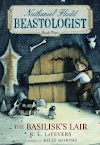 And no, I’m not talking about this blog, although I certainly could be. I always forget the sheer number of tasks I have to catch up on once I cross a deadline—so much of my real life gets put on hold while I meet it.
And no, I’m not talking about this blog, although I certainly could be. I always forget the sheer number of tasks I have to catch up on once I cross a deadline—so much of my real life gets put on hold while I meet it.But I have been thinking about orphans in kid lit for a couple of weeks now, puzzled by how strongly some adult reviewers react to that archetype, calling it a trope or stereotype, bemoaning yet another orphan in childrens’ literature, weak storytelling, etc. Frankly, I am puzzled by this. (And I’m not so much talking about my own books here, or even solely as a writer of kids books, but more as a reader.)
Wild and exciting adventures simply do not usually happen to kids with two loving, responsible parents. They just don’t. Furthermore, orphaned heroes are not all Harry Potter wannabes—people trying to hop on that road to bestsellerdom. The tradition of orphans in kid lit goes back much farther than that. Two of my most favorite books in the world when I was a child, The Secret Garden and The Little Princess, involved orphaned girls, and they were written a hundred years ago, well before Harry Potter.
From a logistical standpoint, just as some claim there are only three or seven or twenty one plots in the entire world, so too are there only a certain number of ways to deal with parents in kids books:
1) Kill them off.
2) Get them off screen in another way—business trip, illness, long hours at the office
3) Have them present in the story unaware of what’s going on
4) Have them present in the story involved in what’s going on
5) Have them be part of the story problem itself
While children’s books are not a genre per se, they are, like many genre books, written with a particular reader in mind—kids. And as such, authors need to speak to those readers needs’, not the adults around them. Sure, some kids will get tired about reading about kids with no parents, and yes, there may be a higher number of them in certain genres of kids books, fantasy say. But they are truly not the only books out there. And just as westerns are expected to feature The West, or romance a happy ending, kids books need to feature kids front and center, making choices, operating in big theaters, acting independently, solving their own problems. Loving, responsible parents get in the way of all that.
I wonder sometimes if adult readers have forgotten that operating in the world without parents is both a child’s greatest fear and greatest longing, usually at the same time. As a kid, we are terrified of losing our parents. What will happen to us if we do? Who will take care of us? And yet, we are fascinated by that possibility as well, especially if they have recently punished us unjustly or curtailed desired activities in some way. ☺ That worry and fascination is even stronger if we have a more complicated, unhappy relationship with our parents, as so many children do.
Childhood is about moving toward independence. Even as young kids, on some deep level, we know we are traveling toward a state of being that will not involve living with our parents, where we will have to operate in the world without them by our side. What safer way to try that on than through books? What better place to see that our lives will still be filled with richness and adventure, in addition to that horrible aloneness we all fear? Throughout the ages, stories and myths have codified behavior, values, and societal expectations; taught us how to be, provided a framework for our lives. Does it not make sense, then, that a large number of books for kids would deal with this enormous step kids are moving towards?
As any parent knows, part of our job as good parents is to ensure our kids will not need us anymore, to help them to grow to independence, to assure them that they can and will live in a world that will not include us by their side—and they will thrive. It seems to me that kids books featuring orphans are simply helping to codify and reassure kids about this basic truth.
I’d be curious to know what you all think. Are orphaned kids like nails on a chalkboard to you? A treasured convention? How do you feel about them?



















